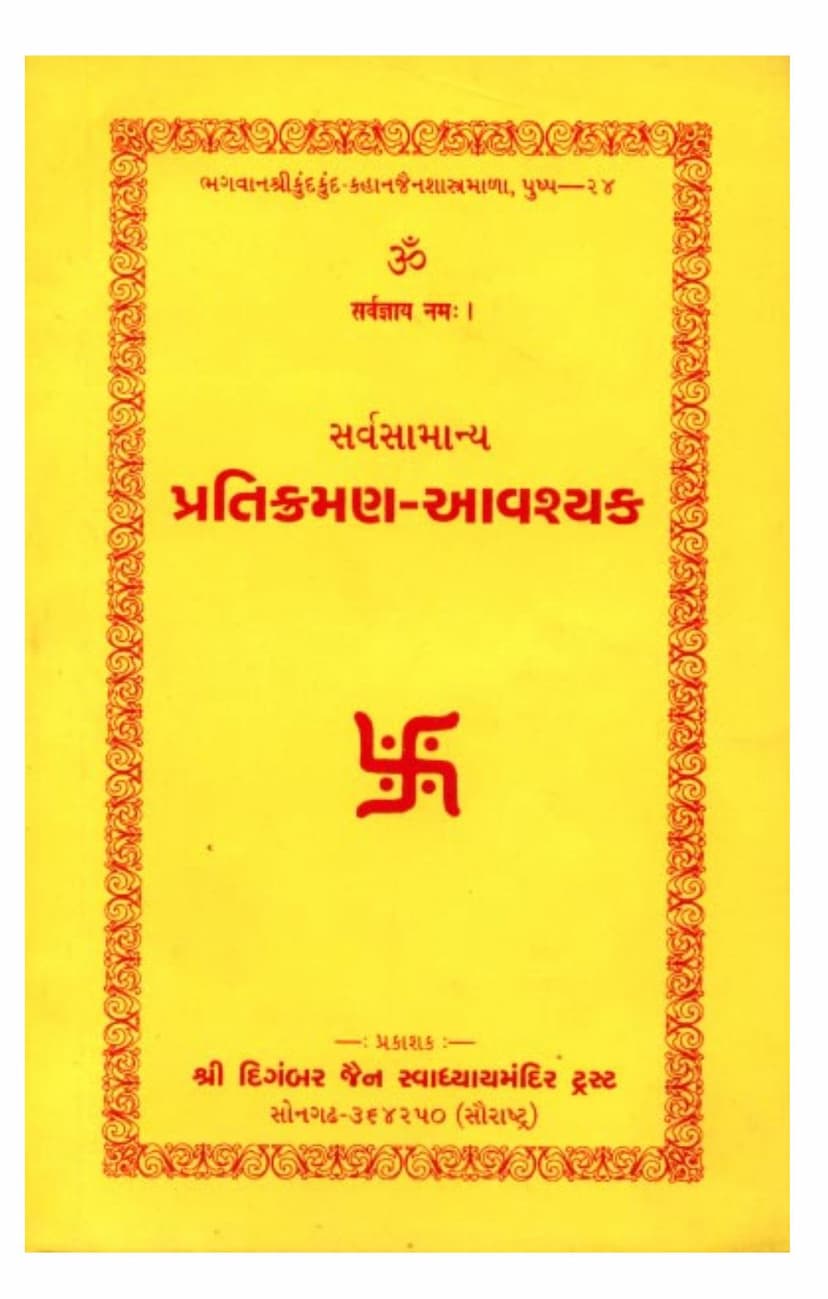Sarva Samanya Pratikraman Avashyak
Added to library: September 2, 2025

Summary
This document is the "Sarva Samanya Pratikraman Avashyak" (Universal/Common Pratikraman Essential), published by the Digambar Jain Swadhyay Mandir Trust, Songadh. It is part of the "Bhagwan Shri Kundakunda-Kahan Jain Shastra Mala" series, appearing as the 24th publication.
The book is a comprehensive guide to performing pratikraman, a fundamental ritual in Jainism, particularly for monks and observant laypeople. It aims to facilitate self-purification and spiritual progress.
Here's a breakdown of the content based on the provided pages:
Core Concepts and Structure:
- Purpose: The book emphasizes that performing this essential ritual daily for self-purification will lead to inner peace.
- Nishchay and Vyavahar: It begins by defining pratikraman from both the ultimate (nishchay) and conventional (vyavahar) perspectives:
- Nishchay Pratikraman: The act of turning the soul away from past good and bad karmas.
- Vyavahar Pratikraman: The internal feeling of self-condemnation for one's past actions and the intention to renounce them, leading to the cessation of inauspicious thoughts.
- Six Divisions of Pratikraman: The text outlines the six essential components of pratikraman:
- Samayika (meditation/equanimity)
- Tirthankar Bhagavan ni Stuti (Praise of the Tirthankaras)
- Vandana (Salutations/Worship)
- Pratikraman (Confession/Repentance)
- Kayotsarga (Abandonment of the body/Self-discipline)
- Pratyakhyan (Renunciation/Abstinence)
- Guidance for Practice: Instructions are provided on how to perform pratikraman: understand the meaning of the verses if possible, or read the explanations. Those with limited time can perform a simplified version.
Detailed Content Sections (Key Topics and Rituals):
The table of contents provides a detailed roadmap of the book's teachings:
- Invocation and Mangalacharan: Starts with prayers to the omniscient, the Namokar Mantra.
- Vandana: Explains the ritual of salutations and reverence towards the Five Supreme Beings (Panch Parmeshthi).
- Samayika: Deeply explores the true nature of samayika, emphasizing equanimity, renunciation of passion (rage-dvesha), non-violence towards all beings, detachment, and focus on the self. It quotes extensively from scriptures like Niyamsara.
- Praise of Tirthankaras: Defines the true form of praising Tirthankara Lords, focusing on those who have conquered senses and passions.
- Six Steps (Kayotsarga): Explains the six stages of self-realization, detailing the nature of the soul: existence, eternality, doership, experiencer, moksha (liberation), and the means to it. It emphasizes understanding the soul as distinct from karmas and the body.
- Sadguru Vandana: Expresses profound gratitude and reverence towards the spiritual teacher (Sadguru) for revealing the true nature of the soul and guiding towards liberation.
- True Nature of Samyak Darshan (Right Faith): Elaborates on the principles of Jainism, distinguishing between the soul (Jiva) and non-soul (Ajeeva), and the correct understanding of reality. It discusses the importance of Nishchay Naya (ultimate truth) over Vyavahar Naya (conventional truth). It details the nature of Pratyakhyan (renunciation) as an aspect of knowledge.
- Understanding Bondage (Bandha): Explains how actions (karma) and passions (kashaya) lead to bondage, emphasizing that true liberation comes from understanding the self and renouncing these.
- Nature of Pure Knowledge (Sarva Vishuddha Gyan): Describes the state of omniscience and the nature of pure consciousness.
- Pratikraman of Errors in Right Knowledge: Discusses overcoming errors related to different types of Jain knowledge (Mati, Shruta, Avadhi, Manahparyaya, Keval Gyan).
- Twelve Vows (Dvadash Vrata): Details the vows taken by lay Jains, including the core five vows (Himsa, Satya, Asteya, Brahmacharya, Aparigraha) and their elaborations, as well as the specific vows of a householder. It delves into the subtle meanings of non-violence, truthfulness, etc., emphasizing the internal disposition over external actions.
- Sanlekhana (Intentional Fast unto Death): Explains the ritualistic fasting for a peaceful end of life.
- Mithyatva (False Belief): Defines Mithyatva and its five types (Ekantika, Vipareet, Sanshayik, Ajnanik, Vainayik) and how to overcome them.
- Four Mangalas: Identifies the four ultimate auspicious entities in Jainism: Arihantas, Siddhas, Sadhus, and the Dharma preached by Kevalis.
- Kshama (Forgiveness): Contains prayers for forgiveness and expresses repentance for transgressions.
- Logassa Sutra: A prayer in Kayotsarga form praising the twenty-four Tirthankaras.
- Pratyakhyan: A ritual of renouncing certain actions or foods for a specified period.
- Namotthunam: A hymn of praise and salutation.
- Swadhyaya (Self-study): Highlights the importance of self-study as the highest penance.
- Second Pratikraman: Outlines the rituals for the annual Samvatsari or for a shorter daily practice. This section includes prayers for the well-being of the Tirthankaras, the glory of celibacy, the nature of omniscient beings, and praise of Samayasara.
- Praise of Aatmasiddhi Shastra: Includes verses from the Aatmasiddhi Shastra, emphasizing self-knowledge and the role of a Guru.
- Samayika Path: Presents verses that define the practice of Samayika.
- Shrवक Kartavya (Duties of a Layman): Lists the six essential daily duties for householders and the eight primary vows for lay Jains.
- Michchhami Dukhadam: A prayer seeking forgiveness from all beings.
- Parampad Prapti ni Bhavana: Contemplations on achieving the ultimate state (Moksha).
- Upadan-Nimitta Dohas & Samvad: Explores the philosophical concept of the self (Upadan - the intrinsic power/soul) versus external causes (Nimitta - incidental factors), engaging in a dialogue to clarify their distinct roles in spiritual progress.
- Guru-upakar Darshan & Pranipt Stuti: Expressions of gratitude to the Guru for imparting spiritual knowledge.
- Gurudev Praty Kshama-Stuti: A prayer for forgiveness and praise directed towards the Guru.
- Tattvika Suvakya: Collection of profound philosophical sayings.
Overall Significance:
This text serves as a practical manual for Jains to understand and perform the essential ritual of pratikraman. It is deeply rooted in the philosophy of self-effort, understanding the true nature of the soul, renouncing passions, and adhering to the path of right faith, right knowledge, and right conduct as taught by the Tirthankaras. The emphasis is on internal purity and renunciation, guided by the wisdom of great Jain scholars and saints.